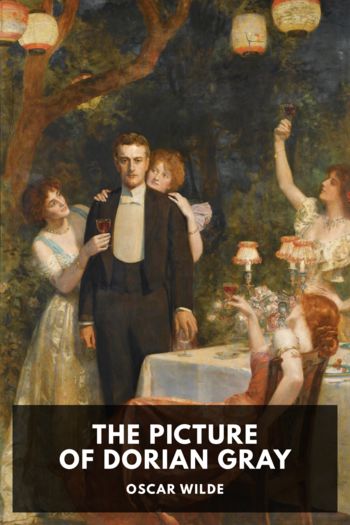The Picture of Dorian Gray by Oscar Wilde (top ebook reader TXT) 📕

Description
The Picture of Dorian Gray was first published as a serial in Lippencott’s Monthly Magazine, and the publishers thought it would so offend readers that they removed nearly 500 words without Wilde’s approval. Wilde soon expanded it and republished it as a novel, including a short preface justifying his art. Even though his contemporaries considered it so offensive that some argued for his prosecution, Dorian Gray today survives as a classic philosophical novel that explores themes of aestheticism and double lives. Couched in Wilde’s trademark cutting wit, Dorian Gray is still being adapted today, with Dorian and his moldering portrait remaining cultural touchstones.
Read free book «The Picture of Dorian Gray by Oscar Wilde (top ebook reader TXT) 📕» - read online or download for free at americanlibrarybooks.com
- Author: Oscar Wilde
Read book online «The Picture of Dorian Gray by Oscar Wilde (top ebook reader TXT) 📕». Author - Oscar Wilde
Dorian rose up from the piano and passed his hand through his hair. “Yes, life has been exquisite,” he murmured, “but I am not going to have the same life, Harry. And you must not say these extravagant things to me. You don’t know everything about me. I think that if you did, even you would turn from me. You laugh. Don’t laugh.”
“Why have you stopped playing, Dorian? Go back and give me the nocturne over again. Look at that great, honey-coloured moon that hangs in the dusky air. She is waiting for you to charm her, and if you play she will come closer to the earth. You won’t? Let us go to the club, then. It has been a charming evening, and we must end it charmingly. There is someone at White’s who wants immensely to know you—young Lord Poole, Bournemouth’s eldest son. He has already copied your neckties, and has begged me to introduce him to you. He is quite delightful and rather reminds me of you.”
“I hope not,” said Dorian with a sad look in his eyes. “But I am tired tonight, Harry. I shan’t go to the club. It is nearly eleven, and I want to go to bed early.”
“Do stay. You have never played so well as tonight. There was something in your touch that was wonderful. It had more expression than I had ever heard from it before.”
“It is because I am going to be good,” he answered, smiling. “I am a little changed already.”
“You cannot change to me, Dorian,” said Lord Henry. “You and I will always be friends.”
“Yet you poisoned me with a book once. I should not forgive that. Harry, promise me that you will never lend that book to anyone. It does harm.”
“My dear boy, you are really beginning to moralize. You will soon be going about like the converted, and the revivalist, warning people against all the sins of which you have grown tired. You are much too delightful to do that. Besides, it is no use. You and I are what we are, and will be what we will be. As for being poisoned by a book, there is no such thing as that. Art has no influence upon action. It annihilates the desire to act. It is superbly sterile. The books that the world calls immoral are books that show the world its own shame. That is all. But we won’t discuss literature. Come round tomorrow. I am going to ride at eleven. We might go together, and I will take you to lunch afterwards with Lady Branksome. She is a charming woman, and wants to consult you about some tapestries she is thinking of buying. Mind you come. Or shall we lunch with our little duchess? She says she never sees you now. Perhaps you are tired of Gladys? I thought you would be. Her clever tongue gets on one’s nerves. Well, in any case, be here at eleven.”
“Must I really come, Harry?”
“Certainly. The park is quite lovely now. I don’t think there have been such lilacs since the year I met you.”
“Very well. I shall be here at eleven,” said Dorian. “Good night, Harry.” As he reached the door, he hesitated for a moment, as if he had something more to say. Then he sighed and went out.
XXIt was a lovely night, so warm that he threw his coat over his arm and did not even put his silk scarf round his throat. As he strolled home, smoking his cigarette, two young men in evening dress passed him. He heard one of them whisper to the other, “That is Dorian Gray.” He remembered how pleased he used to be when he was pointed out, or stared at, or talked about. He was tired of hearing his own name now. Half the charm of the little village where he had been so often lately was that no one knew who he was. He had often told the girl whom he had lured to love him that he was poor, and she had believed him. He had told her once that he was wicked, and she had laughed at him and answered that wicked people were always very old and very ugly. What a laugh she had!—just like a thrush singing. And how pretty she had been in her cotton dresses and her large hats! She knew nothing, but she had everything that he had lost.
When he reached home, he found his servant waiting up for him. He sent him to bed, and threw himself down on the sofa in the library, and began to think over some of the things that Lord Henry had said to him.
Was it really true that one could never change? He felt





Comments (0)